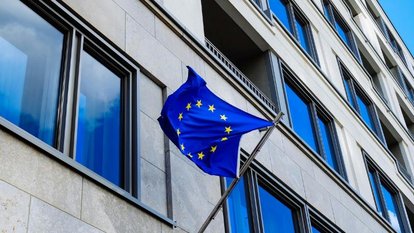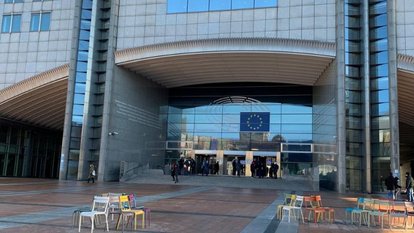EU- Mercosur Free Trade Agreement
The Spanish-German Axis: A Strategic Driver of the EU-Mercosur Agreement

Mercosur boat at Rio de Janeiro, Brazil.
© Luiz Fernando PexelsA Strategic Agreement: More Relevant Than Ever
With the summit between the European Union and the Community of Latin American and Caribbean States (EU-CELAC) scheduled for November in Colombia, and Europe's increasing urgency to strengthen its Latin American foreign policy, the EU-Mercosur trade agreement debate is back in the spotlight. This agreement is founded on three core pillars: political dialogue, cooperation, and trade, notably eliminating over 90% of bilateral tariffs.
In an interview with FNF Europe, Carlos Malamud, Senior Fellow for Latin America at the Spanish think tank Elcano Royal Institute, points out “Trump’s arrival and his tariff-based trade policy gave new momentum to the agreement.” He added that the EU was already committed to the treaty, since the impact of the war in Ukraine had already “accelerated the project from a European perspective,” by prompting a search for new allies and the diversification of partnerships.
In this context, some countries, like France, have begun to soften their stance. “Even the French, who were strongly opposed, have started to tone down their criticism,” says Malamud. While President Macron continues to publicly oppose the agreement, it is increasingly likely that the trade component—, which is essential for the agreement’s partial entry into force—will soon be approved by the European Parliament.
Spain: Europe´s natural Bridge to Latin America
Spain has consistently played a strategic role in promoting the EU-Mercosur agreement, leveraging its deep cultural and economic ties with Latin America. It is no coincidence that diplomatic efforts to finalize the treaty's political chapter significantly accelerated during Spain's presidency of the Council of the EU in the second half of 2023.
As Malamud explains, “Spain has a clearly proactive role” and works “in coordination with Germany” to push for the ratification. Its vast business network in the region, familiarity with local dynamics, and ability to engage with Latin American governments make Spain a strategic partner for the success of the agreement.
Moreover, Spain’s firm position contrasts with the ambiguity or agricultural protectionism of other Member States. While France and Austria have emphasized environmental concerns, Spain has embraced a “shared solutions” approach— viewing sustainability not as a barrier, but as an opportunity for cooperation.
Germany has notably echoed this perspective, becoming one of the treaty's strongest advocates within the EU. Svenja Hahn, MEP for the Free Democratic Party (FDP) and President of the ALDE Party, has been vocal in European Parliament debates, defending the treaty as a pragmatic response to global challenges. She criticized what she described as “populist fear-mongering” around free trade, arguing that the real issue lies not with trade itself, but with excessive EU bureaucracy that limits the competitiveness of European farmers.
Hahn emphasized that the agreement includes safeguards for sensitive sectors like agriculture, noting that beef import quotas represent only 1.5% of EU consumption—roughly a 200-gram steak per person per year. Far from undermining climate goals, she highlighted that the agreement is conditional on compliance with the Paris Agreement, thereby reinforcing climate protection efforts.
From an economic standpoint, Hahn stressed the deal’s potential: 800,000 EU jobs are linked to trade with Mercosur, with over 12,000 German companies—70% of them SMEs—currently exporting to the region. Reduced tariffs could yield €4 billion in savings, boost access to critical raw materials, and reduce dependency on autocratic regimes. For Hahn, the agreement is not just about economics; it is a strategic imperative for Europe’s resilience, global cooperation, and defense of democratic partnerships.
German-Spanish cooperation has been vital in this context. Germany values Spain’s experience as a “bridge to the region,” considering its business know-how and diplomatic capital to help gain traction in Latin America. Joint initiatives in sustainability, green investment, and EU-CELAC forums reflect this pragmatic, functional, and strategic alliance.

EU Flag
© Adrien Olichon PexelsA Win-Win for Europe and Latin America
Malamud notes that if the agreement goes into effect, “the EU would have free trade agreements with 94% of Latin America’s GDP, compared to 44% for the United States and 14% for China.” This advantage would cement Europe’s role as a key economic partner for Latin America and strengthen its global presence at a time when other actors—especially China—are moving quickly.
Beyond the direct economic impact, Malamud emphasizes that the agreement could serve as a catalyst for deeper regional integration in Latin America by “harmonizing the rules of engagement for trade with the EU.” A realistic “win-win” scenario that would not only boost bi-regional trade but also intra-regional trade.

European Parliament
© FNF EuropeWhat Lies Ahead?
The EU-CELAC Summit in November represents a key opportunity to announce ratification—at least of the partial trade component—of the agreement. According to Malamud, “It would be a clear proof that Europe is truly interested in Latin America.” Such an announcement would carry not only symbolic weight but also operational significance, paving the way for the trade chapter—the most economically important—to enter into force.
On the Mercosur side, Malamud points out that Brazilian President Lula da Silva has demonstrated strong commitment to the treaty, providing the regional leadership necessary for its approval. Even Argentine President Javier Milei, whose early rhetoric suggested a possible exit from the bloc, has since reaffirmed his country’s continued participation in Mercosur, acknowledging the challenges of pursuing a standalone agreement with the United States.
A More Engaged Europe in Latin America
More than a trade deal, the ratification of the EU-Mercosur agreement represents a strategic choice about Europe's place in the evolving global landscape. As Carlos Malamud eloquently puts it, "It’s a treaty where everyone wins." Its consolidation would signify not just economic advancement but also a profound political commitment to strengthening ties with Latin America.
Spain and Germany, with their complementary strengths, are positioned to be the driving forces behind this momentum. Their collaborative efforts hold the potential to transform what, after two and a half decades of complex negotiations, seemed to be a missed opportunity into a vibrant new chapter in bi-regional relations.
Odilia Abreu is a policy analyst specializing in migration, political diaspora, and liberal thought in Southern Europe. Her work focuses on the intersection of mobility, democratic governance, and regional integration, with particular attention to how diasporic communities influence electoral politics and policymaking across the EU. Odilia Abreu currently works as a freelance expert, advising organizations including the Friedrich Naumann Foundation for Freedom (FNF) Europe in Brussels, where she provides analyses on political developments in Spain, Portugal, and Italy.
